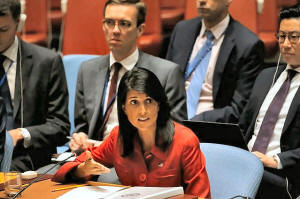|
Iran rejects U.S. demand for U.N.
inspector visit to military sites
 Send a link to a friend
Send a link to a friend
 [August 29, 2017]
ANKARA (Reuters) - Iran has
dismissed a U.S. demand for U.N. nuclear inspectors to visit its
military bases as "merely a dream" as Washington reviews a 2015 nuclear
agreement between Tehran and six world powers, including the United
States. [August 29, 2017]
ANKARA (Reuters) - Iran has
dismissed a U.S. demand for U.N. nuclear inspectors to visit its
military bases as "merely a dream" as Washington reviews a 2015 nuclear
agreement between Tehran and six world powers, including the United
States.
U.S. President Donald Trump has called the nuclear pact - negotiated
under his predecessor Barack Obama - "the worst deal ever". In April, he
ordered a review of whether a suspension of nuclear sanctions on Iran
was in the U.S. interest.
The U.S. ambassador to the United Nations, Nikki Haley, last week
pressed the International Atomic Energy Agency (IAEA) to seek access to
Iranian military bases to ensure that they were not concealing
activities banned by the nuclear deal.

"Iran's military sites are off limits... All information about these
sites are classified," Iranian government spokesman Mohammad Baqer
Nobakht told a weekly news conference broadcast on state television.
"Iran will never allow such visits. Don't pay attention to such remarks
that are only a dream."
Under U.S. law, the State Department must notify Congress every 90 days
of Iranís compliance with the nuclear deal. The next deadline is
October, and Trump has said he thinks by then the United States will
declare Iran to be non-compliant.
Under terms of the deal, the international nuclear watchdog can demand
inspections of Iranian installations if it has concerns about nuclear
materials or activities.
[to top of second column] |

U.S. Ambassador to the United Nations Nikki Haley speaks to the U.N.
Security Council as it meets to discuss the recent ballistic missile
launch by North Korea at U.N. headquarters in New York, U.S., July
5, 2017. REUTERS/Mike Segar

During its decade-long stand-off with world powers over its nuclear
program, Iran repeatedly rejected visits by U.N. inspectors to its
military sites, saying they had nothing to do with nuclear activity
and so were beyond the IAEA's purview.
Iran has placed its military bases off limits also because of what
it calls the risk that IAEA findings could find their way to the
intelligence services of its U.S. or Israeli foes.
(Writing by Parisa Hafezi; Editing by Raissa Kasolowsky/Mark
Heinrich)
[© 2017 Thomson Reuters. All rights
reserved.]
Copyright 2017 Reuters. All rights reserved. This material may not be published,
broadcast, rewritten or redistributed.
 |